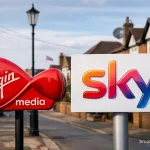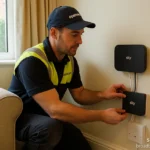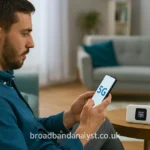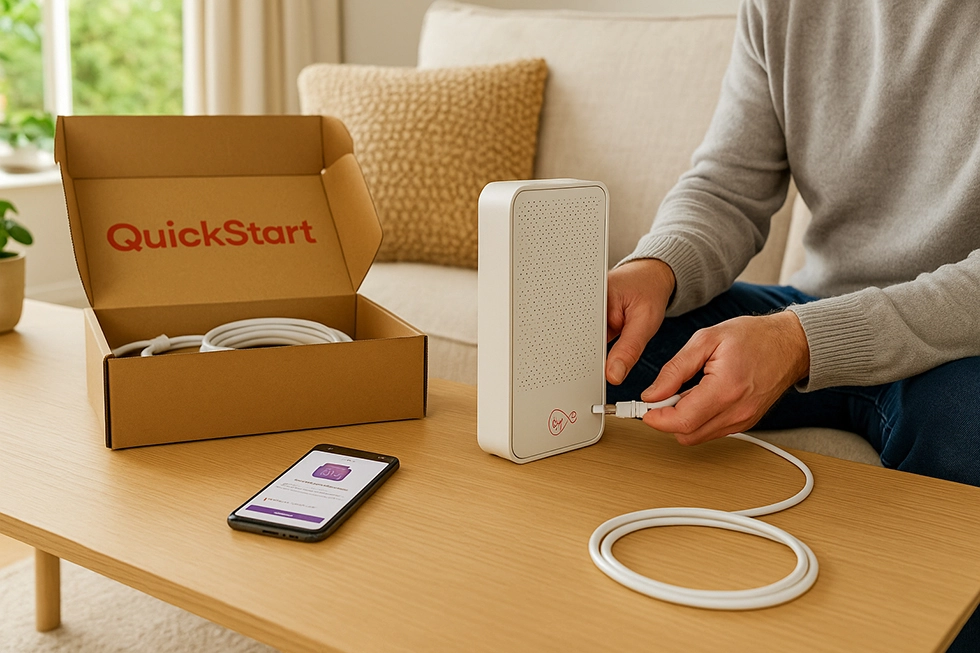Vodafone has introduced a new customer service feature called “Just Ask Once”, aimed at fixing long-standing frustrations in UK broadband and mobile support. The promise is simple: one agent handles your issue from start to finish. This means no more repeated explanations, long wait times, or being passed around multiple departments. But beyond the headline, this change reflects a deeper shift in how customer support is evolving across the UK telecom sector—where poor service is often a bigger issue than the technology itself.

Customer Service Delays
For many broadband customers, the biggest problem isn’t slow download speeds or high prices—it’s getting support when something goes wrong. Repeatedly explaining the same problem to different people, being kept on hold, and having to chase updates are all common experiences. Vodafone’s new system eliminates that by assigning a single agent who stays on the case until the issue is sorted. If the fix can’t happen straight away, customers will be messaged with regular updates—through the MyVodafone app, at their convenience.
This system mirrors the simplicity of modern helpdesk tickets, but Vodafone adds a commitment: if they can’t deliver what they promised, customers can leave without paying an exit fee. That’s a bold policy, especially in an industry known for contract traps and opaque cancellation terms.
How It Works: One Agent, Ongoing Support
The service is app-based and currently available for broadband, mobile, and small office/home office (SOHO) users. Once a query is raised, a dedicated support agent is assigned. That agent is responsible for handling the request, replying within the app, and keeping the customer informed throughout the resolution process.
Some exceptions apply—like complex engineering or technical issues that may still need specialist teams. But even then, the main support agent is expected to stay in the loop and coordinate communication. This reduces the risk of confusion and miscommunication, especially during line installations or home broadband moves.
Will One-Person Support Improve UK Broadband Support?
Most UK broadband providers still operate outdated support models. Ofcom data from Q4 2024 listed Virgin Media as one of the most complained-about providers in fixed broadband, mostly due to customer service and billing issues. TalkTalk and Sky also faced criticism, particularly for slow problem resolution and poor agent training.
Customer service is also a major factor in broadband comparison rankings. While providers like Zen Internet and Plusnet score well for satisfaction, they don’t always offer the fastest broadband packages or full fibre coverage. Vodafone, in contrast, provides competitive fibre-to-the-premises (FTTP) plans with solid speeds, and is now looking to match that with better service.
Surveys show that nearly 40% of broadband customers in the UK say they’ve had to repeat their issue more than once to different agents. Nearly a third say they’ve waited on hold for more than 20 minutes to reach support. These are the pain points Vodafone is trying to eliminate.
Customer Support in the UK
Despite improvements in network infrastructure, support systems remain stuck. Common issues include:
- Long delays during full fibre installation, particularly with Openreach coordination.
- Lack of visibility into fault progress or engineer appointments.
- Inflexible support hours and call centres with long queues.
- Complex cancellation processes, often involving high early exit fees.
These problems are compounded when customers face technical issues like router malfunctions, poor upload speed, or random dropouts—particularly with shared line (FTTC) services. When support fails, even fast broadband becomes unusable.
Benefits of ‘Just Ask Once’
If Vodafone can consistently deliver on its promise of single-agent support, it could set a new benchmark. The integration with the MyVodafone app gives users control over when and how they respond—especially useful for working professionals, students, and families who can’t afford to spend hours chasing fixes.
The real benefit comes from transparency. Knowing who’s handling your query, and that you’ll be updated without needing to chase, builds trust. And the no-exit-fee policy, if upheld without hurdles, removes the fear of being trapped in a bad service experience.
It’s also strategically smart. Vodafone is currently merging its broadband and mobile operations under the Vodafone-Three group. Creating a unified support system adds value to its convergence plans, where users combine mobile, broadband, and SIMs in one bundle.
Where Other Providers Stand
Most broadband providers in the UK still separate mobile and broadband support. Virgin Media, for instance, offers fast FTTP speeds—up to 1.1 Gbps on its Gig1 plan and even 2 Gbps on Gig2 in selected areas—but continues to score poorly for service satisfaction. Hyperoptic and Community Fibre, two FTTP-only providers with multi-gigabit options, are often praised for reliability and support but are limited in coverage.
Openreach-based providers like BT, Sky, Plusnet, and TalkTalk often depend on Openreach engineers for installations and fixes, which slows down response times. Some, like BT, offer “Smart Hubs” and backup 4G dongles, but their customer service still faces frequent complaints—especially when it comes to chasing progress or billing errors.
Vodafone In Current FTTP Market
Vodafone delivers FTTP through both Openreach and CityFibre. This gives it a broad footprint, covering millions of homes across urban and suburban areas. On Openreach, it offers speeds up to 900Mbps down and 100Mbps up. On CityFibre lines, symmetric speeds—like 900/900—are common.
Here’s how major UK FTTP providers compare:
- BT and Sky: Offer FTTP via Openreach; strong brand trust but patchy support and higher prices.
- Virgin Media O2: Offers DOCSIS and now XGS-PON fibre; fast download speeds, but upload still lags.
- Community Fibre: Only in London; symmetrical speeds, good pricing, strong service ratings.
- Hyperoptic: Urban-only FTTP; gigabit symmetrical, good support, limited footprint.
- CityFibre (via Vodafone, Zen, etc.): Expanding coverage, symmetrical speeds, competitive pricing.
Vodafone benefits from having access to both Openreach and CityFibre’s growing XGS-PON network. This lets it offer ultrafast speeds to more locations than many rivals, while combining mobile and broadband into flexible bundles.
A Practical Move Toward Better Service
Vodafone’s “Just Ask Once” is not a technical upgrade—but it could prove more valuable than speed boosts or price cuts. By fixing the most frustrating part of broadband—poor support—it taps into a customer need that no other major UK provider is solving well.
If it works as promised, it will give Vodafone a real edge in a crowded, often criticised broadband market. And it may force competitors to rethink not just their pricing or speeds, but how they treat users when things go wrong.










